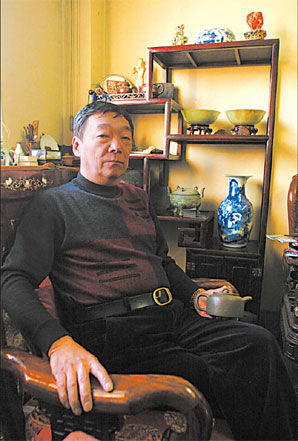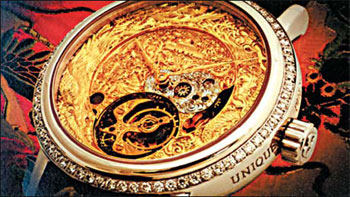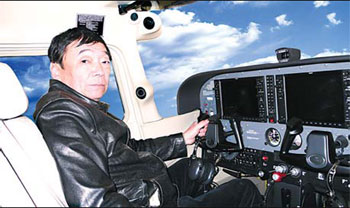Zhang Youxu is taking afternoon tea in his living room, where he casually places a finely carved stone (Tianhuang) worth more than 1 million yuan on a DVD player. A rare Qing Dynasty teapot covered with a thick layer of dust sits on the window sill, and a 300-year-old porcelain dish can be seen in a cabinet, along with loads of discarded newspapers and magazines.

A corner of Zhang Youxu's living room, where Zhang takes afternoon tea, showcases a wide range of his collections. Jiang Dong
The 58-year-old man looks indifferent to his belongings. It is as if the excitement of owning these priceless treasures has entirely faded.
Zhang's collections are wide ranging, including world-brand watches, tobacco pipes, cameras and cars. Accordingly, his two-story building is more like an overstuffed warehouse, even the floor is covered with different kinds of things, revealing the changes of the owner's interests through the years.
Zhang doesn't have a business card to introduce himself, except to say that he is a man without fixed duties.
But for insiders, the Beijinger is a grand master of many fields - a founding father of Chinese Harley Motorcyclists' Club, a collector of thousands of antique teapots and inkstones, and an expert on identifying jewelry and jades for instance.
"I never regard myself as a collector. I just love to take pleasure in different things," he says, "I always purchase the best, thus I won't get obsessed about how to get something better. My principle is having no regrets about people and things."
The wealthy collector appears to be like any other ordinary middle-aged person, but he has an aura of sadness. His three dearly loved Tibetan Mastiffs died accidentally a few months ago after the maid gave them the wrong food.
Even worse, Zhang's wife died of a sudden illness this March, leaving him alone in the 300-sqm villa outside the city. They don't have any offspring.
He keeps drinking and smoking. Breaking the silence is his black hill myna, which is able to say "what a wondering night!"
"My friends bought it for me. They taught the bird to say the words to satirize me, as I hide by day and come out at night," he explains in a typical Beijing dialect, slow and muffled, as if slightly drunk.
He doesn't have a normal working life, except for attending some meetings. Zhang normally stays in bed until noon.

"Playing Dragon & Phoenix", a tourbillion wristwatch, featuring engraved patterns on both surfaces of the main plate, bridges and the wheel's spokes.
If he hasn't received any calls from his friends by 4 pm, Zhang starts to panic, "Chatting with my friends is an intrinsic part of my life. I love to spend time with them."
He shows no concern for his treasures when friends or visitors come around at night, and refuses to keep them in a safe place.
"Things of a kind come together, people of a kind fall into the same group. If my friends were money-mad and stole my things, then I would not be a good person," he explains.
Zhang has been collecting since he was a child.
He was born into a wealthy family. His father and other relatives were senior Kuomintang officials before 1949.
As the only child, he was the apple of his parents' eye and was never allowed to play with other children. So, the boy had to play whatever he got at home, including antiques, jewelry and jade.
When the teenager grew up, he developed an interest in motorbikes. Despite his mother's concern for his safety, his fourth aunt told him to buy a Harley Davidson.
After days of research, he learnt that only Tianqiao, a former second-hand market in Beijing, had three Harley Davidson motorbikes left by Kuomintang. He bought one for 350 yuan ($50), and later purchased his first-ever Leica camera for 1,700 yuan ($243).
But all of his collectables were lost during the "cultural revolution" (1966-76).
He and his family were driven away from their traditional quadrangle dwelling and lived in the kitchen for more than a decade, while most of the family's treasures were damaged or confiscated. The few they concealed were secretly sold off cheaply for food.
Later, he went to study at Chinese Geology University majoring in precious stones and mineralogy. Before he found a job, he became rich again, thanks to his overseas relatives who didn't have offspring themselves and left their entire fortune to him when they died.
Unlike some newly-affluent Chinese people who invest in antiques and art, Zhang has always treated collecting as a hobby.
Over the past two years, Zhang has provided free technical support for the Beijing Watch Factory (BWAF).
Zhang participated in the designing of "Playing Dragon & Phoenix", a tourbillion wristwatch, which was displayed at the Basel World Watch & Jewellery Show in 2006.
It is the first watch to feature engraved patterns on both surfaces of the main plate, bridges and the wheel's spokes. Later that year, the watch was sold for 1.08 million yuan ($125,000).
"Zhang is a godfather-like figure in many fields. Watches are just one of them," BWAF general manager Miao Hongbo says.
"Although he is not a professional watch maker, he has comprehensive knowledge in this regards, and he even knows some things our experts don't know."
Under Zhang's supervision, the factory last month produced a tourbillion minute repeater, which has only previously been made in Switzerland and Germany.
Zhang has also collected more than 200 katydid or cricket containers, which were popular among rich officials between the Qing Dynasty (1644-1911) and the early years of the 20th century.
"It's a dying culture, but I believe it is worth collecting to help younger generations who might otherwise never know about the past," he says.
There is no need for him to stroll around antique markets to spot treasures, as people automatically come to him for business, or he entrusts agencies to bid on his behalf for treasures in domestic and overseas auctions.

Zhang Youxu's new hobby is to learn to pilot an aircraft. Courtesy of Zhang Youxu
His favorite treasure, surprisingly, is a homemade pen cap, a gift from his fourth aunt.
"When I entered a primary school, I got a pair of Parker pens. So, my aunt used my father's riding boots to make the cap by her own hands," he says. "It reminds me of her love, which is priceless."
Despite having the kind of wealth that many people dream of, Zhang says his life isn't perfect.
"I feel lost," he says with a great sigh. "Getting obsessed with one thing is a way to conflict with reality."
As a billionaire, Zhang's lifestyle is surprisingly simple. He doesn't watch much TV, preferring to read when his friends are not around; he isn't a party animal, and never celebrates his birthday; he shuns extravagant clothes, and didn't allow his wife to wear fur. He has no luxury furniture at home, and the bedstead he has been using since his wedding was made from an abandoned tank for goldfish.
"When you have nothing to fight for, life can be very simple, and you should create your own culture," he says.
Now, he is learning to fly his private fixed wing plane.
Zhang says that he will donate all of his treasures to the country after he dies, "at least they will be looked after in a better way."
"Even though you have a lot of land you only need a small hole in the ground to rest forever. Money is just a number," he says.
(China Daily April 2, 2008)